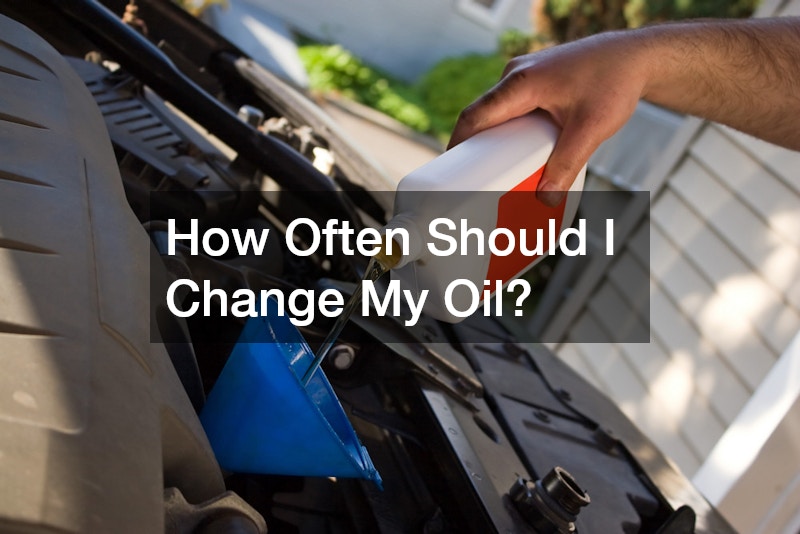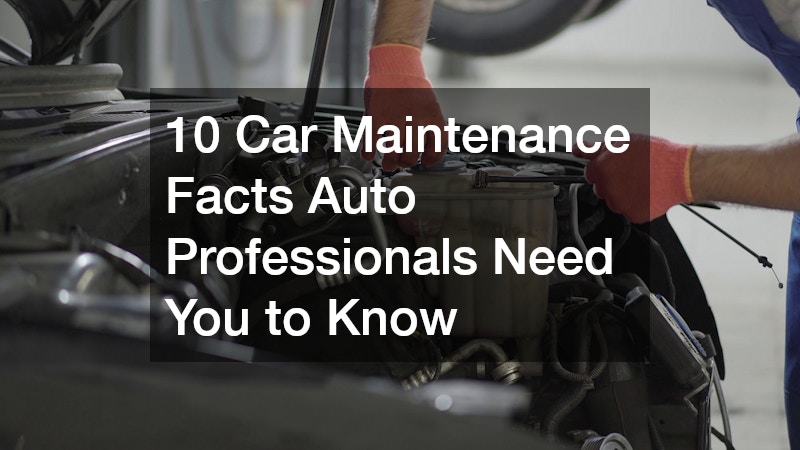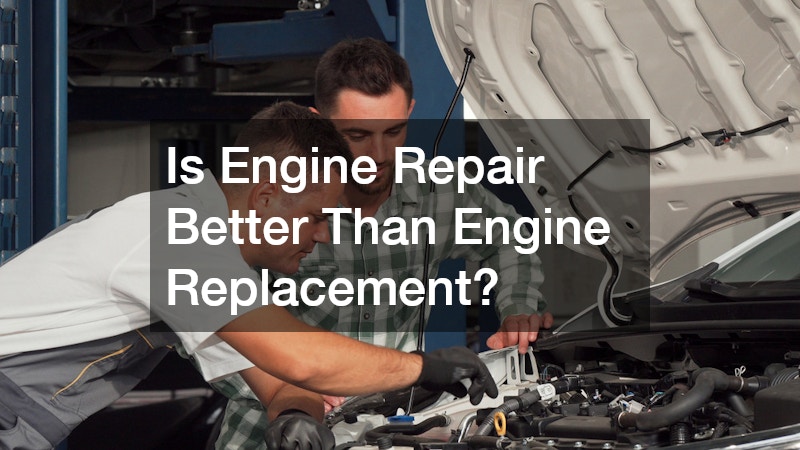In today’s fast-paced world, understanding car maintenance is crucial for ensuring the longevity and efficiency of your vehicle. Proper car maintenance is not just about keeping your car running smoothly; but it also plays an essential role in ensuring your safety on the road. Auto professionals wish that every car owner would recognize the importance of routine checks and take proactive measures to keep their vehicles in top shape. This article will cover ten essential car maintenance facts that every auto professional wishes you knew. By incorporating these practices into your routine, you’ll not only extend your vehicle’s life but also potentially avoid costly repairs and accidents. Let us embark on this journey to uncover the truths about car maintenance and equip you with the knowledge to handle your vehicle with care and expertise.
Many vehicle issues begin as minor problems that, if caught early, can be addressed quickly and affordably. Simple tasks like checking tire pressure, monitoring fluid levels, and listening for unusual sounds can help detect problems before they escalate. These small efforts go a long way in preventing breakdowns and ensuring your vehicle remains reliable. Regular oil changes, often overlooked, are one of the most critical maintenance tasks. Engine oil lubricates, cleans, and cools engine parts. Neglecting oil changes can lead to reduced performance, overheating, or even complete engine failure. Similarly, replacing air filters helps maintain optimal fuel efficiency and engine performance, especially in dusty or high-traffic environments.
Another key area is your car’s braking system. Brake pads wear down over time and, if left unchecked, can damage rotors and compromise your ability to stop safely. Professionals strongly recommend having your brakes inspected at regular intervals to avoid dangerous situations. Ultimately, proactive maintenance empowers you to stay ahead of potential issues rather than reacting to emergencies. It contributes not just to a better-performing vehicle, but also to your confidence behind the wheel.
How Often Should I Change My Oil?

One of the fundamental car maintenance facts is understanding the significance of regular oil changes. Typically, auto body shop professionals recommend changing your vehicle’s oil every 3,000 to 5,000 miles, depending on the manufacturer’s guidelines and your driving habits. Neglecting regular oil changes can result in the accumulation of sludge, which can severely impact engine performance and lifespan.
Fresh oil ensures that your engine runs smoothly by providing adequate lubrication to all internal components. This maintenance practice helps in preventing overheating, reducing friction, and enhancing fuel efficiency. Thus, staying on top of your oil change schedule is a crucial preventative measure to keep your car running efficiently.
Moreover, it’s essential to choose the right type of oil for your vehicle, as specified in your owner’s manual. Discussing your options with a trusted local auto body service can help you make informed decisions based on your driving patterns and vehicle requirements. Consistently adhering to oil change intervals ensures your vehicle’s engine remains healthy and robust.
What Are the Most Important Fluids to Check?
Aside from oil, several other fluids are vital to your vehicle’s performance and should be checked regularly. These include coolant, transmission fluid, brake fluid, and windshield washer fluid. Knowing these car maintenance facts will protect your vehicle from potential damage and maintain optimal performance.
Coolant is essential in regulating your engine’s temperature, preventing it from overheating. Meanwhile, transmission fluid ensures smooth gear transitions and can be critical to your vehicle’s overall performance. Brake fluid, often overlooked, plays a crucial role in ensuring your car’s braking system functions effectively.
As recommended by many auto accident attorneys, ensuring your vehicle is well-maintained can contribute to accident prevention. Adequate levels of these vital fluids ensure the proper functioning of major systems in your car. Checking and replenishing these fluids regularly can prevent future issues and costly repairs down the line.
When Should I Replace My Tires?
Tire maintenance is another pivotal aspect of car care that can significantly impact your vehicle’s safety and performance. An auto insurance agency advises replacing your tires every six years or when the tread depth reaches 2/32 of an inch. Regularly inspecting your tires for wear and damage is one of the key car maintenance facts that can enhance safety on the road.
Under-inflated or excessively worn tires can compromise your car’s handling and increase stopping distances. This can be particularly hazardous in wet or icy conditions, emphasizing the need for regular checks. Proper tire maintenance includes monitoring pressure, rotating tires, and checking alignment regularly.
Neglecting tire maintenance can lead to blowouts or accidents, potentially resulting in damage and costly legal ramifications involving personal injury lawyers. Proactively managing your tire health by rotating them every 6,000 to 8,000 miles ensures even wear and extends tire life. Taking these steps will help in maintaining optimal balance and traction, improving overall driving safety.
How Can I Improve My Car’s Fuel Efficiency?

Improving fuel efficiency is not only cost-effective but also beneficial for the environment. One simple way to enhance your car’s fuel efficiency is by maintaining proper tire pressure. According to car maintenance facts, regularly checking and inflating your tires can lead to significant savings at the pump.
An often overlooked contributor to fuel efficiency is the condition of your air filter. A clean air filter allows for better airflow to the engine, which can improve combustion and fuel economy. Replacing a clogged air filter is a low-cost maintenance measure that can produce noticeable improvements in your vehicle’s fuel efficiency.
Auto professionals at local auto body services also suggest reducing excess weight in your vehicle and avoiding unnecessary idling. Keeping your vehicle well-maintained, including regular oil changes and tune-ups, can further optimize your fuel efficiency. By following these practices, you can achieve better mileage and reduce your environmental footprint.
Why Is Regular Brake Inspection Important?
The braking system is one of the most critical safety components of your vehicle. Regular brake inspections are essential car maintenance facts that can prevent potential accidents. Most experts recommend examining your brakes every 10,000 to 12,000 miles or at the first sign of decreased performance.
Worn-out brakes can significantly increase stopping distances and reduce control over the vehicle. This can be particularly dangerous, leading to potential collisions and resulting in a need for cash for junk car services. Addressing brake issues early avoids costly repairs and ensures the safety of the driver and passengers.
During a brake inspection, professionals check the brake pads, rotors, and fluid levels, ensuring all components function correctly. Consistent brake maintenance prolongs the system’s life and safeguards the vehicle, providing peace of mind on the road. Regular check-ups help identify issues before they escalate into more serious problems, protecting everyone involved.
What Is the Role of the Battery in My Vehicle?
The vehicle’s battery is critical in powering the starter motor, ignition system, and other electrical components. Understanding the role of the battery is part of the essential car maintenance facts everyone should know. A healthy battery ensures reliable startups and supports the functioning of crucial systems such as lights and GPS.
Regularly inspecting the battery terminals for corrosion and ensuring the battery is securely mounted are fundamental maintenance steps. Auto ceramic coatings can protect the battery terminals from corrosion, ensuring reliable connections and prolonging the battery’s life. It’s also prudent to be aware of your battery’s age, replacing it every three to five years as a preventive measure.
Auto professionals recommend being mindful of signs indicating a weak battery, such as dimming headlights or slow engine cranks. Proactively addressing these issues can prevent inconvenient breakdowns and ensure uninterrupted operation of your vehicle. Keeping your battery in optimal condition supports the efficiency and reliability of your car’s electrical systems.
How Critical Are Regular Vehicle Inspections?

Regular vehicle inspections form a vital part of preventative car maintenance. These inspections provide an opportunity to identify and rectify minor issues before they escalate into significant problems. As part of car maintenance facts, vehicle inspections include checking various systems, such as engine performance, fluid levels, brakes, and suspension.
Frequent inspections can help prevent costly repairs and improve the safety and reliability of your vehicle. Many personal injury lawyers advise regular inspections to reduce the risk of accidents due to mechanical failures. Keeping a regular inspection schedule ensures that your vehicle remains roadworthy and legally compliant.
Regular inspections not only extend the vehicle’s lifespan but also enhance its resale value. Documented records of consistent maintenance can reassure potential buyers of the vehicle’s condition, facilitating smoother sales processes. This preventative approach to vehicle care saves money and improves car performance.
What Are Common Misconceptions About Car Maintenance?
There are numerous misconceptions about car maintenance that can lead to neglect or improper care. One common myth is that modern cars do not require routine checkups, which can lead to unanticipated breakdowns and reliance on junk car services. Recognizing these car maintenance facts is essential for responsible car ownership.
Another misconception is that dealership car detailing and maintenance services are unnecessary extras. While aesthetics might seem secondary to function, regular detailing protects your vehicle’s finish and preserves its value. Detailing waxes and polishes the exterior, safeguarding it against weather-related damage.
Clarity on these beliefs allows car owners to prioritize crucial maintenance tasks over misconceptions. Debunking these myths provides car owners with a clear understanding of proper vehicle care and maintenance. Educated car owners can evade common pitfalls and ensure their vehicle’s optimal performance is maintained.
How Does Weather Affect Vehicle Maintenance?
Weather conditions can significantly influence your vehicle’s maintenance needs. Cold weather can affect battery performance and fluid viscosity, highlighting the importance of timely checks and replacements. These car maintenance facts are crucial for safeguarding your vehicle from adverse weather effects.
Heat can also impact your vehicle by increasing tire pressure and the risk of overheating. Regularly checking the cooling system, tires, and other heat-sensitive components will mitigate damage from extreme temperatures. Dealership car detailing can help protect your car’s exterior from sun exposure, which can cause paint fading and cracking.
Rain, snow, and ice place added strain on windshield wipers, brakes, and tire treads, requiring more frequent inspections. By staying vigilant with the seasonal maintenance specific to your local climate, you enhance safety and prolong your vehicle’s lifespan. This proactive approach ensures your car remains in prime condition throughout the year.
What Should I Know About Car Maintenance Schedules?

Adhering to a consistent car maintenance schedule is a cornerstone of effective vehicle care. These schedules, outlined in your vehicle’s owner’s manual, guide when to perform specific maintenance tasks. Following these car maintenance facts ensures that your car operates at peak efficiency.
Familiarity with your vehicle’s maintenance schedule assists in timely servicing, such as car hail damage repairs and fluid replacements. Skipping these scheduled tasks can lead to mechanical issues and reduce the vehicle’s lifespan. An organized maintenance routine supports safe driving and lowers the risk of unexpected breakdowns.
Maintaining a log of all services performed helps track upcoming tasks and provides valuable records for potential buyers. Staying on schedule with maintenance services provides peace of mind, knowing that every aspect of your car is operating at its best. Compliance with your car’s maintenance schedule is a straightforward approach to maximizing the vehicle’s reliability and value.
Incorporating These Car Maintenance Facts
Being informed about car maintenance not only saves money but also enhances your vehicle’s performance and safety. Regular maintenance routines, including oil changes, tire replacements, and fluid checks, are essential car maintenance facts that extend your vehicle’s lifespan. By recognizing the role each component plays in your car’s functionality, you can prevent significant issues and enjoy a smoother driving experience.
Auto professionals wield extensive knowledge that can aid in understanding the intricate workings of your vehicle. By consulting with local auto body services and engaging in preventative maintenance behaviors, you safeguard yourself against costly repairs and accidents. These proactive efforts ensure your vehicle operates efficiently, delivering a reliable and safe experience.
Armed with these facts, you can better navigate the road to vehicle wellness. Addressing car maintenance seriously promotes the longevity and efficiency of your vehicle while reducing accident risks. These practices empower car owners to drive with confidence, knowing that their vehicle has been well-maintained and is in optimal condition.






